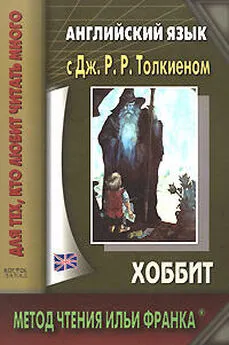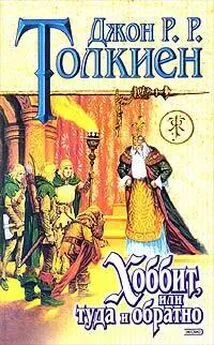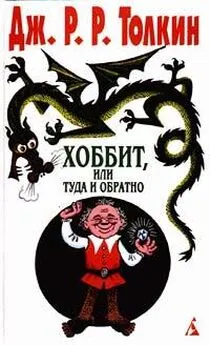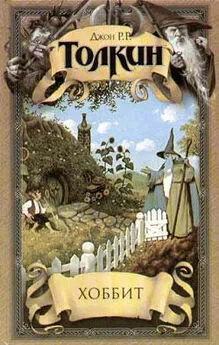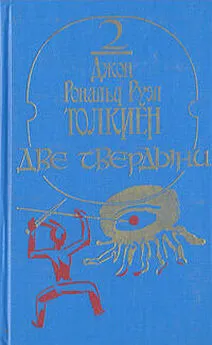Джон Толкиен - Английский язык с Дж. Р. Р. Толкиеном. Хоббит
- Название:Английский язык с Дж. Р. Р. Толкиеном. Хоббит
- Автор:
- Жанр:
- Издательство:АСТ, Восток-Запад
- Год:2008
- Город:Москва
- ISBN:978-5-17-048593-2, 978-5-478-00597-9
- Рейтинг:
- Избранное:Добавить в избранное
-
Отзывы:
-
Ваша оценка:
Джон Толкиен - Английский язык с Дж. Р. Р. Толкиеном. Хоббит краткое содержание
В книге предлагается произведение на английском языке Джона Р. Р. Толкиена «Хоббит», адаптированное (без упрощения текста оригинала) по методу Ильи Франка. Уникальность метода заключается в том, что запоминание слов и выражений происходит за счет их повторяемости, без заучивания и необходимости использовать словарь.
Пособие способствует эффективному освоению языка, может служить дополнением к учебной программе.
Предназначено для студентов, для изучающих английский язык самостоятельно, а также для всех интересующихся английской культурой.
Пособие подготовила Ольга Ламонова.
Английский язык с Дж. Р. Р. Толкиеном. Хоббит - читать онлайн бесплатно полную версию (весь текст целиком)
Интервал:
Закладка:
“Very well (очень хорошо), ” said Bilbo, who was anxious to agree (которому очень хотелось согласиться), until he found out more about the creature (до тех пор, пока он не выяснит больше об этом существе), whether he was quite alone (был ли тот действительно совершенно один), whether he was fierce or hungry (и был ли он свирепым или голодным), and whether he was a friend of the goblins (и был ли он другом гоблинов).
polite [pǝˈlaɪt] riddle [ˈrɪdl] anxious [ˈæŋkʃǝs]
“Sssss, ” said Gollum, and became quite polite. “Praps ye sits here and chats with it a bitsy, my preciousss. It like riddles, praps it does, does it?” He was anxious to appear friendly, at any rate for the moment, and until he found out more about the sword and the hobbit, whether he was quite alone really, whether he was good to eat, and whether Gollum was really hungry. Riddles were all he could think of. Asking them, and sometimes guessing them, had been the only game he had ever played with other funny creatures sitting in their holes in the long, long ago, before he lost all his friends and was driven away, alone, and crept down, down, into the dark under the mountains. “Very well, ” said Bilbo, who was anxious to agree, until he found out more about the creature, whether he was quite alone, whether he was fierce or hungry, and whether he was a friend of the goblins.
“You ask first (ты загадываешь первым), ” he said, because he had not had time to think of a riddle (потому что у него не было времени подумать о какой—нибудь загадке).
So Gollum hissed (тогда Голлум прошипел):
What has roots as nobody sees (у чего есть корни, которых никто не видит),
Is taller than trees (и выше чем деревья),
Up, up it goes (вверх и вверх оно идет),
And yet never grows (и все же никогда не растет)?
“Easy (легко)!” said Bilbo (сказал Бильбо). “Mountain, I suppose (гора, я полагаю). ”
“Does it guess easy (что, так легко догадаться)? It must have a competition with us (он должен соревноваться с нами), my preciouss (мой драгоценный)! If precious asks (если драгоценный спрашивает), and it doesn’t answer (и тот не отвечает), we eats it (мы съедим его), my preciousss (мой драгоценный). If it asks us (если он спрашивает нас), and we doesn’t answer (и мы не отвечаем), then we does what it wants, eh (тогда мы сделаем то, что он хочет, а)? We shows it the way out, yes (мы покажем ему дорогу отсюда, да)!”
“All right (хорошо)!” said Bilbo, not daring to disagree (не осмеливаясь не согласиться), and nearly bursting his brain (и его мозги чуть не лопнули) to think of riddles (придумывая загадки) that could save him from being eaten (которые могли бы спасти его от /возможности/ быть съеденным).
mountain [ˈmaʋntɪn] competition [kɔmpɪˈtɪʃ (ǝ) n] bursting [ˈbǝ: stɪŋ]
“You ask first, ” he said, because he had not had time to think of a riddle. So Gollum hissed:
What has roots as nobody sees,
Is taller than trees,
Up, up it goes,
And yet never grows?
“Easy!” said Bilbo. “Mountain, I suppose. ”
“Does it guess easy? It must have a competition with us, my preciouss! If precious asks, and it doesn’t answer, we eats it, my preciousss. If it asks us, and we doesn’t answer, then we does what it wants, eh? We shows it the way out, yes!”
“All right!” said Bilbo, not daring to disagree, and nearly bursting his brain to think of riddles that could save him from being eaten.
Thirty white horses on a red hill (тридцать белых лошадей на красном холме),
First they champ (сперва они чавкают/громко жуют),
Then they stamp (затем они топают),
Then they stand still (затем они стоят спокойно).
That was all he could think of to ask (это было все, о чем он мог придумать спросить) — the idea of eating (мысли о еде) was rather on his mind (явно засели у него в голове; mind — ум, разум, память ). It was rather an old one, too (это была довольно старая загадка к тому же), and Gollum knew the answer as well as you do (и Голлум знал ответ так же хорошо, как и вы).
“Chestnuts, chestnuts (банальные загадки; chestnut—каштан; /разг. / избитый мотив, анекдот и т. д. ), ” he hissed (прошипел он). “Teeth (зубы)! Teeth (это зубы)! my preciousss (мой драгоценный); but we has only six (но у нас только шесть /зубов/; we has = we have )!”
Then he asked his second (затем он загадал свою вторую /загадку/):
Voiceless it cries (это кричит без голоса: «безголосо это кричит»),
Wingless flutters (машет без крыльев: «бескрыло машет»),
Toothless bites (кусается без зубов: «беззубо кусается»),
Mouthless mutters (бормочет безо рта).
“Half a moment (минуточку; half — половина )!” cried Bilbo (закричал Бильбо), who was still thinking uncomfortably about eating (который все еще думал тревожно о еде). Fortunately (к счастью) he had once heard something rather like this before (он когда-то уже слышал что-то подобное), and getting his wits back (и вернувшись в мыслях назад) he thought of the answer (он подумал об ответе).
horse [hɔ: s] chestnut [ˈtʃesnʌt] fortunately [ˈfɔ: tʃ (ǝ) nǝtlɪ]
Thirty white horses on a red hill,
First they champ,
Then they stamp,
Then they stand still.
That was all he could think of to ask — the idea of eating was rather on his mind. It was rather an old one, too, and Gollum knew the answer as well as you do.
“Chestnuts, chestnuts, ” he hissed. “Teeth! teeth! my preciousss; but we has only six!”
Then he asked his second:
Voiceless it cries,
Wingless flutters,
Toothless bites,
Mouthless mutters.
“Half a moment!” cried Bilbo, who was still thinking uncomfortably about eating. Fortunately he had once heard something rather like this before, and getting his wits back he thought of the answer.
“Wind, wind of course (ветер, конечно же ветер), ” he said, and he was so pleased (и он был так доволен) that he made up one on the spot (что придумал еще одну загадку тут же, на месте).
“This’ll puzzle (это озадачит) the nasty little underground creature (/это/ отвратительное маленькое подземное создание), ” he thought (думал он):
An eye in a blue face (глаз на синем лице)
Saw an eye in a green face (увидел глаз на зеленом лице).
“That eye is like to this eye (тот глаз похож на этот глаз) ”
Said the first eye (сказал первый глаз),
“But in low place (но внизу: «в низком месте»),
Not in high place (а не наверху: «на высоком месте»).
“Ss, ss, ss (с-с-с), ” said Gollum. He had been underground a long long time (он пробыл под землей долгое-долгое время), and was forgetting this sort of thing (и стал забывать подобные явления). But just as Bilbo was beginning to hope (но, как раз когда Бильбо начинал надеяться) that the wretch would not be able to answer (что этот негодник не сможет ответить), Gollum brought up memories of ages and ages and ages before (Голлум вернул воспоминания дальних-дальних времен: «веков и веков и веков до этого»), when he lived with his grandmother in a hole (когда он жил со своей бабушкой в норе) in a bank by a river (на берегу реки), “Sss, sss, my preciouss (с-с, мой драгоценный), ” he said. “Sun on the daisies it means, it does (солнце и маргаритки: «солнце, /светящее/ на маргаритки», вот что это значит, да). ”
puzzle [ˈpʌz (ǝ) l] wretch [retʃ] memory [ˈmem (ǝ) rɪ]
“Wind, wind of course, ” he said, and he was so pleased that he made up one on the spot. “This’ll puzzle the nasty little underground creature, ” he thought:
An eye in a blue face
Saw an eye in a green face.
“That eye is like to this eye”
Said the first eye,
“But in low place,
Not in high place.
“Ss, ss, ss, ” said Gollum. He had been underground a long long time, and was forgetting this sort of thing. But just as Bilbo was beginning to hope that the wretch would not be able to answer, Gollum brought up memories of ages and ages and ages before, when he lived with his grandmother in a hole in a bank by a river, “Sss, sss, my preciouss, ” he said. “Sun on the daisies it means, it does. ”
But these ordinary aboveground everyday sort of riddles (но этот тип загадок, обычных, надземных, каждодневных загадок) were tiring for him (был утомителен для него). Also they reminded him of days (также они напомнили ему о тех днях) when he had been less lonely (когда он был менее одинок) and sneaky (и /менее/ подлый/крадущийся; to sneak — красться, подкрадываться; идти крадучись ) and nasty (и /менее/ отвратительный), and that put him out of temper (и это вывело его из себя; temper — нрав, характер; настроение ). What is more they made him hungry (более того, они вызвали у него голод); so this time he tried something a bit more difficult (и тогда, на этот раз он попытал нечто более сложное) and more unpleasant (и более неприятное):
It cannot be seen (это нельзя увидеть: «не может быть увиденным»), cannot be felt (нельзя пощупать),
Читать дальшеИнтервал:
Закладка:
